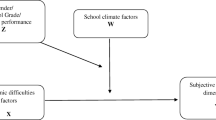Abstract
School leaderships and all the elements that integrate it differ in their attitudes and values toward Social Justice. In the current national and international context, with intense echoes on schools’ life, the importance of assessing the attitudes and values of school leaders concerning behaviors related to Social Justice, but also other constructs that may be associated, becomes essential. The present study aims to evaluate the school leader’s perception of in the Portuguese territory concerning Social Justice. Data Collection: The perceptions of 22 schools/clusters principals were collected using the Social Justice Scale developed by (Torres-Harding et al. in Am J Commun Psychol 50(1–2):77–88, 2012 [21]). Findings: In general, the results strongly support toward a positive attitude regarding Social Justice and to a greater agreement of the subjects regarding the dimension of personal attitudes toward Social Justice, concerning the perceived behavioral control dimensions, to subjective norms regarding justice and to behavioral intentions to engage in Social Justice.
Access this chapter
Tax calculation will be finalised at checkout
Purchases are for personal use only
Similar content being viewed by others
Notes
- 1.
In the present study, we have translated and adapted the scale and subscales developed by Torres-Harding [21] to assess the school principals’ perception toward to Social Justice.
- 2.
(Mean ± standard deviation).
References
Abramson, J.H.: Survey Methods in Community Medicine—Epidemiological Studies, Programme Evaluation, Clinical Trials. 4th edn. Churchill Livingstone (1990)
Ajzen, I.: The theory of planned behavior. Organ. Behav. Hum. Decis. Process. 50(2), 179–211 (1991). https://doi.org/10.1016/0749-5978(91)90020-T
Antunes, R.R., Silva, A.P.: A Liderança dos Professores para a Equidade e a Aprendizagem. Revista Lusófona de Educação 30, 73–97 (2015)
Araújo, J.: A Nova Gestão Pública da Escola, MSc dissertation, Universidade Portucalense—Infante D. Henrique, Porto (2007)
Bogotch, I.E.: Educational leadership and social justice: practice into theory. J. School Leadersh. 12 (2002). https://doi.org/10.1177/105268460201200203
Caixeiro, C.: Liderança e cultura organizacional: o impacto da liderança do diretor na(s) cultura(s) organizacional(ais) escolar(es), PhD thesis, Universidade de Évora, Évora (2014)
Constantine, M.G., et al.: Social justice and multicultural issues: implications for the practice and training of counselors and counseling psychologists. J. Couns. Dev. 85(1), 24–29 (2007). https://doi.org/10.1002/j.1556-6678.2007.tb00440.x
Dalmoro, M., Vieira, K.: Dilemas na construção de Escalas de tipo Likert: O número de itens e a disposição influenciam nos resultados? REVISTA GESTÃO ORGANIZACIONAL, 6-Edição Especial, pp. 161–174 (2013)
Fontes, A.: Escola e Educação de Valores. Livros Horizonte, Lisboa (1990)
Fouad, N.A., Gerstein, L.H., Toporek, R.L.: Social justice and counseling psychology in context. In: Handbook for Social Justice in Counseling Psychology: Leadership, Vision, and Action. Sage Publications, Inc, Thousand Oaks, CA, US, pp. 1–16 (2006). https://doi.org/10.4135/9781412976220.n1
Fouad, N.A., Prince, J.P.: Social justice in counseling psychology. In: The Oxford handbook of counseling psychology, pp. 856–872. Oxford University Press (Oxford library of psychology.), New York, NY, US (2012)
Freire, P.: Pedagogy of the oppressed. Continuum International Publishing Group, New York (1970)
Gümüş, S., Arar, K., Oplatka, I.: Review of international research on school leadership for social justice, equity and diversity. J. Educ. Admin. Hist. 53(1), 81–99 (2021). https://doi.org/10.1080/00220620.2020.1862767
Kline, P.: Handbook of Psychological Testing, 2nd ed. Taylor and Francis (2013)
Moyo, O.N.: A commitment to social justice in a capitalist democracy: are we being critical citizens or just moving along Clichés? J. Progressive Hum. Serv. 21(1), 3–7. https://doi.org/10.1080/10428231003782236
Oliveira, T.: Teses e dissertações—recomendações para a elaboração e estruturação de trabalhos científicos. 1a. Editora RH (2002)
Prilleltensky, I.: Value-based praxis in community psychology: moving toward social justice and social action. Am. J. Commun. Psychol. 29(5), 747–778 (2001). https://doi.org/10.1023/A:1010417201918
Ryan, J.: Inclusive leadership and social justice for schools. Leadersh. Policy Schools 5(1), 3–17 (2006). https://doi.org/10.1080/15700760500483995
Schwartz, S.H.: An overview of the schwartz theory of basic values.Online Readings Psychol. Cult. 2(1) (2012). https://doi.org/10.9707/2307-0919.1116
Shields, C.M., Hesbol, K.A.: Transformative leadership approaches to inclusion, equity, and social justice. J. School Leadersh. 30(1), 3–22 (2020). https://doi.org/10.1177/1052684619873343
Torres-Harding, S.R., Siers, B., Olson, B.D.: Development and psychometric evaluation of the social justice scale (SJS). Am. J. Commun. Psychol. 50(1–2), 77–88 (2012). https://doi.org/10.1007/s10464-011-9478-2
UNESCO: Manual para garantir inclusão e equidade na educação. UNESCO, Paris (2019)
Acknowledgements
The authors gratefully acknowledge the financial support provided by the Center for Research, Development and Innovation (CIDI-IEES), and the Research Center in Basic Education (CIEB-IPB), who recently welcomed Nuno Paula Santos as Integrated Researcher. The authors express their deepest appreciation to all school principals who collaborated in the present study.
Declaration of Conflicting Interest
The authors declared no potential conflicts of interest with respect to the research, authorship, and/or publication of this article.
Author information
Authors and Affiliations
Corresponding author
Editor information
Editors and Affiliations
Rights and permissions
Copyright information
© 2023 The Author(s), under exclusive license to Springer Nature Singapore Pte Ltd.
About this paper
Cite this paper
Santos, N.P., Gonçalves, S., Paulo, E., Martins, R., Pascoinho, J. (2023). Attitudes and Values of Portuguese School Principals Concerning Social Justice. In: Mesquita, A., Abreu, A., Carvalho, J.V., Santana, C., de Mello, C.H.P. (eds) Perspectives and Trends in Education and Technology. ICITED 2023. Smart Innovation, Systems and Technologies, vol 366. Springer, Singapore. https://doi.org/10.1007/978-981-99-5414-8_66
Download citation
DOI: https://doi.org/10.1007/978-981-99-5414-8_66
Published:
Publisher Name: Springer, Singapore
Print ISBN: 978-981-99-5413-1
Online ISBN: 978-981-99-5414-8
eBook Packages: Intelligent Technologies and RoboticsIntelligent Technologies and Robotics (R0)




